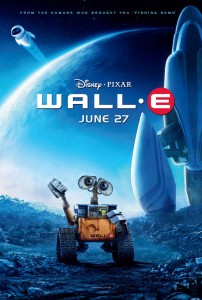It’s a little late I know, but Hollywood takes it’s time coming to Sri Lanka. So when finally taking the kids to a movie about a robot called Wall-E, and not expecting much more than a couple of hours of mild entertainment, the reality came as a surprise. Writer/Director Andrew Stanton delivers a wolf in sheep’s clothing, or rather a deeply insightful socio-political commentary on 21st Century society in the guise of a ‘cosmic comedy’. And all that in a movie in which the entire dialogue between the two main ‘characters’ is restricted to synthesised squeaks of each other’s names.
And Wall-E achieves its overt and covert objectives beautifully, for there is delight in the eyes of the children present, nicely matching the consternation in those of their adult escorts.
The spaceship ‘Axiom’ is the home of mankind 700 years hence, ‘Wall-E’ is a trash compacting robot that has survived on a polluted and long abandoned earth. Falling in love with robotic probe ‘Eve’, Wall-E pursues her to the Axiom and sets off a chain of events that ends in the return of the exiled earthlings. An improbable scenario …. but only if you have not seen the movie yet. If you have though, it is a deeply impactful observation on our human civilization.
One of the commentaries about the deeper significance of Wall E come from the Ludwig von Mises Institute, and I cannot agree with Gennady Stolyarov II that,
“The film blatantly conveys environmentalist, anticapitalist, and antitechnological propaganda – and aims it at an audience of children, who still lack the critical faculties and intellectual sophistication to evaluate all relevant aspects of the issues presented.”
It is after all a metaphor and the beauty of metaphoric expression is the transference of the essence of its meaning across different situations. If Stanton had wanted to express his point more literally, he could have produced a documentary. Unfortunately though, portraying the reality as it is, is clearly not securing any result and thus the potence of Wall-E’s message. Stanton himself is somewhat modest about his achievement,
“I wasn’t trying to make some sort of mean-spirited comment on consumerism or today’s society.”
Not mean spirited maybe, but definitely about today’s society. The BnL Corporation is the embodiment of the worst aspects of our current economic system. The evolution of big business is seeing the emergence of oligopolies – in turn taking their influence from commerce into politics, the environment and eventually BnL Corporation – one all encompassing giant corporation. Sounds far fetched? Please take a look at the US and English beer and alcoholic beverages categories, defence equipment, tobacco, oil, accounting services, grocery retailing and gradually also the media. Compare those highly concentrated industries and their methodology, thirst for profit, and pursuit of power with their incarnation just 25 years ago. Tempered with that reality a BnL scenario may not seem so distant.
Wall-E touches on some of the more ominous aspects of the dominance of BnL and the extension of that corporation influence into the lives of the humans that sustain it. In soft and inviting tones, computerised announcements unleash on an increasingly obese and pliant mankind, ominous forms of food, beverage and services which only succeed in dehumanizing humanity. Finally the faceless and ultimately inhuman BnL Corporation erupts from behind its deceptively pleasing mask as the ‘system’ encounters the disagreement of a hitherto compliant captain, who decides to return to earth. Much like its 21st Century ‘siblings’, when threatened, the robot agents of the BnL corporation resort to violence, deception, theft and all sorts of criminality to protect the corporation – now taking on semblance of Orwell’s Big Brother. The robots of BnL try desperately to hide proof of the existence of plant life on earth, seeking to maintain the status quo and their power by perpetuating the untruth that earth was still uninhabitable. Fortunately for Stanton’s future earthlings, their Captain leads them in a mammoth effort to shed the effects of seven centuries of gross consumerism and corporate hypnosis, and they triumph.
Ken’s TimeImmortal blog offers:
“… he (Stanton) presents a world that appears to have fallen into rule by a form of “soft” corporate fascism, in which a megacorporation (Buy N’ Large) had taken over pretty much every aspect of society, including government. Indeed, even the “liners” that humanity used to escape the planet were built and branded by “BNL”. It’s basically as though Wal-Mart ran the world, with food services outsourced to McDonald’s. If anything, WALL-E is less a commentary on environmentalism as it is on overdependency and perpetual adolescence…”
Like Ken, Rod Dreher offers a more accurate summary of the significance of ‘Wall-E’ than the Ludwig von Mises Institute, as he writes:
“Wall-E opens up the discerning viewer’s imagination, inviting him to consider what authentic personal and communal human goods we have lost as we’ve gained prosperity and mastery over nature and how we might get them back. Wall-E is the kind of movie that presents planting a garden as a revolutionary act. One way or another, we’re all living on the Axiom. Wall-E is a call to wake up, stand up and abandon ship. ”
Wake up.
